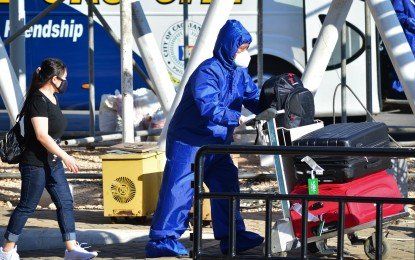Philippine News Agency • May 26, 2020
333 OFWs arrive in Mindanao via sweeper flights

RETURNING HOME. Wearing protective suits, government personnel assist the returning overseas Filipino workers upon arriving at the Laguindingan Airport in Laguindingan, Misamis Oriental, before going to their respective hometowns in Mindanao on Monday (May 26, 2020). Two sweeper flights flew in the 333 OFWs who were stranded in Metro Manila to Mindanao after spending more than two months following the declaration of enhanced community quarantine in Luzon. (PNA photo by Jigger J. Jerusalem)
CAGAYAN DE ORO CITY – Three hundred thirty-three overseas Filipino workers (OFWs) stranded in Luzon following the coronavirus disease lockdown arrived through “sweeper flights” that landed at the Laguindingan Airport in Laguindingan, Misamis Oriental, on Monday.
The OFWs arrived in two separate flights: the Air Asia Airbus A320 planes that brought 155 OFWs landed at the airport at 3:35 p.m., while the 10:15 p.m. flight ferried 178 workers, said Job de Jesus, manager of the Civil Aviation Authority of the Philippines (CAAP) in the region.
The passengers had their temperatures checked and went through sanitation before stepping into the airport terminal, he said. Nobody in the afternoon flight showed symptoms of the coronavirus disease 2019 (Covid-19) such as fever, chills and cough, De Jesus added.
De Jesus said that the returning OFWs also underwent the same health protocols prior to their flights at the Ninoy Aquino International Airport.
Petrona Bergado, Overseas Workers Welfare Administration-10 (OWWA-10) regional director, said the returning OFWs come from Caraga, Northern Mindanao, Zamboanga Peninsula and Bangsamoro Autonomous Region in Muslim Mindanao regions.
Bergado said more than 500 OFWs from all over Mindanao, including Monday’s arrivals, passed through the region’s ports of entry at the Macabalan wharf and Laguindingan Airport since April.
Bergado assured the returning OFWs have gone through the required 14-day quarantine while staying in Manila and were already tested for coronavirus.
“They have with them their RT-PCR test results and they have already complied with the quarantine procedure,” she said, adding it is up to the local governments if they will still subject their returning residents to a quarantine once they get home.
The RT-PCR refers to the real-time reverse transcription-polymerase chain reaction, a method used by health specialists to detect the presence of coronavirus in a person’s body. Bergado said OWWA has paid for the plane tickets of the returning OFWs.
Martin Visabella Jr., 47, from Dipolog City, said he arrived in the Philippines on March 16 after being told to go home by his employer. He worked as a hotel crew of a cruise ship based in San Francisco, California, in the United States.
He said his annual leave was supposed to be on May 24 but he was ordered to return to the country before his scheduled vacation.
Visabella said he and other OFWs stayed at the New Clark City Athletes Village in Capas, Tarlac for two weeks, and was made to undergo another 14-day quarantine once they arrived in Metro Manila.
He said he had to grapple with boredom while on quarantine, adding: “It was very strict. We just stayed in our rooms, but we followed the rules.”
Bergado said many of the overseas workers affected by the coronavirus pandemic have also availed of the labor department’s financial aid.
In Northern Mindanao, at least PHP16 million was already given out to the OFWs who were displaced due to the Covid-19 pandemic.
Bergado said that there are around 24,000 OFWs who are still in quarantine facilities all over the Philippines, as the government is awaiting the return of 40,000 more from other countries.
She also said OFWs are expected to arrive in the region’s ports before proceeding to their destinations in other parts of Mindanao from Monday until Wednesday (May 27).
She said 29 OFWs from the city and 35 from Misamis Oriental were turned over to their respective local government authorities, while those from other areas outside the region have to stay in Cagayan de Oro for the night while waiting for the transport vehicles to take them home. (PNA)

